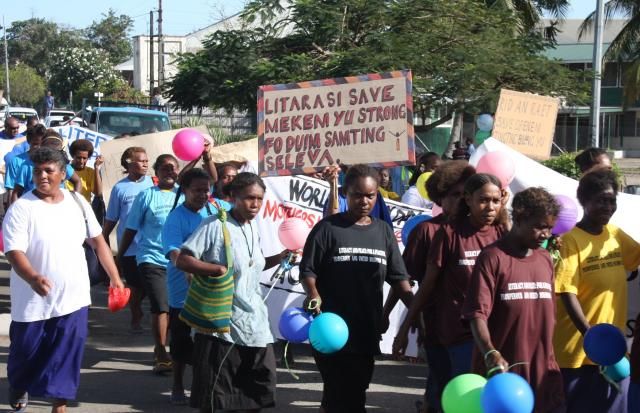International Literacy Day – September 8

In recognition of International Literacy Day, learners around the world are coming together to speak out about how literacy has changed their lives, and – in keeping with the theme of International Literacy Day 2012– about how it has contributed to peace and unity. At the same time, learners are making sure that governments understand the need for greater investment in both formal and informal education, in order for literacy rates to sustainably increase.
In the capital city of the Solomon Islands, the event was marked a day early, with testimony, poems, dance and proud celebration as over 180 literacy students, teachers and supporters paraded through downtown Honiara. Among the participants were an estimated 95 teachers and learners from classes sponsored by the Mothers’ Union of the Anglican Church of Melanesia (ACOM), our local church partner – along with two Episcopal Relief & Development staff (my colleague Nagulan Nesiah and me)!
According to the most recent census figures, the illiteracy rate in the Solomon Islands is 35.1%. This is reportedly the highest of all the Pacific Island nations.
The Mothers’ Union of the Anglican Church of Melanesia, which includes the countries of Solomon Islands and Vanuatu, has joined national efforts to reduce illiteracy by using the greatest strength and resource they have – their members. Working with teaching tools and trainers provided by their government and the national literacy network (LASI), Mothers’ Union members have become both volunteer teachers and active recruiters of literacy learners. This year alone, there are an estimated 1,680 learners in 73 literacy classes throughout the two countries.
The Mothers’ Union–sponsored literacy classes are so impressive that as a part of today’s ceremony, the Ministry of Education presented ACOM with an Award of Excellence.
The fun that Nagulan and I had attending the celebration today was surpassed only by the laughs and tears we shared with learners earlier this week, as they told their stories during our visits to some of their classes and communities.
Rachel is a 60-something-year-old learner in Gwaunaoa Community Literacy Class, in the Diocese of Malaita. She was particularly entertaining as she recounted the reasons behind never having learned to read when young – including that her parents didn’t want her writing love letters to boys. She also described how, three years ago, she joined the literacy class and persisted with her studies despite her husband’s laughter and teasing when she left the house (and her housework) behind, notebook in hand.
Many others also shared their stories with smiles and pride. Pride in reading the names of the hospital wards for an elderly family member, pride in reading the destination noted on the front of the bus, pride in reading whether to push or pull the shop door open, and pride in writing a love letter to a husband.
Together with our local partners, Episcopal Relief & Development supports literacy programs in several countries as part of an integrated development strategy. This focus helps communities move toward attaining Millennium Development Goals 1, 2 and 3 – eradicating poverty, achieving universal primary education and empowering women.
———-
Tammi Mott is a Program Officer with Episcopal Relief & Development.
Photos: Top – International LIteracy Day celebrants in the Solomon Islands march through the capital city, Honiara. Bottom – Rachel, a learner from the literacy class in Gwaunaoa, Diocese of Malaita, shares her skills with a Mother’s Union member. Classes first started in the community in 2007 and continue today, with 36 students currently attending.


